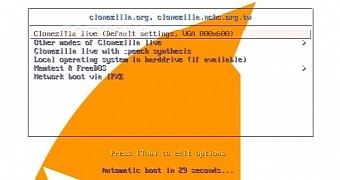The open source and freely distributed Clonezilla Live disk cloning and imaging live system recently received a new stable release that adds several new features, enhancements, and other changes.
Clonezilla Live 2.5.5-38 is now the latest stable release of the live system based on the open-source partition and disk imaging and cloning Clonezilla software. It's synced with the software repositories of the Debian Sid operating system series and uses a recent kernel from the Linux 4.15 branch.
However, one of the most interesting feature of the Clonezilla Live 2.5.5-38 release is a new massive deployment mechanism based on the BitTorrent technology. Developer Steven Shiau explains that Clonezilla now needs to convert the original disk image to the special format when using the new BitTorrent mode for mass deployments.
Users should keep in mind though that the new BitTorrent mass deployment mechanism will require more disk space in the image repository than the standar one. Clonezilla Live 2.5.5-38 also comes with the Partclone 0.3.11-drbl3 open source partition clone and restore tool offering support for a new image format.
Clonezilla Live now supports the lz4 and zstd compression algorithms
The new Clonezilla Live release also introduces support for lz4/lz4mt (-z8/-z8p) and zstd/pzstd (-z9/-z9p) compression algorithms, a new channel bonding option when configuring the network, as well as new -pe and -pfe options to the ocs-sr tool so you can enter passwords in the command options, though it's not safe.
There's also a new -cbm option added to the ocs-live-feed-img tool and a new "ocs_netlink_timeout" boot parameter to allow users to assign a network link detection timeout to the ocs-live-netcfg component. The "ocs_litesrv_mode" boot parameter was removed and dnsmasq relay now works for UEFI network boot clients.
"Add a workaround to make dnsmasq relay work for uEFI network boot clients. i.e., we have to assign the tftp server IP address in grub network boot loader. This is only necessary when dnsmasq is used to relay the DHCP request from clients to existing DHCP service," said developer Steven Shiau in the release notes.
Other than that, the prep-ocsroot tool can now use disk block devices like /dev/sdc as an image repository, the ocs-chnthn tool now supports device names like /dev/nvme0n1p1, the drbl-chntpw package was replaced with chntpw, and Clonzilla Live now supports UUID and LABEL for image repositories.
As expected, various bugs were squshed in this release, adding support for modifying Windows 10 hostnames via the ocs-chnthn tool, and allowing the cnvt-ocs-dev component to properly convert EBR, such as sda2-ebr. You can download Clonezilla Live 2.5.5-38 right now through our web portal for 64-bit and 32-bit systems.

 14 DAY TRIAL //
14 DAY TRIAL //